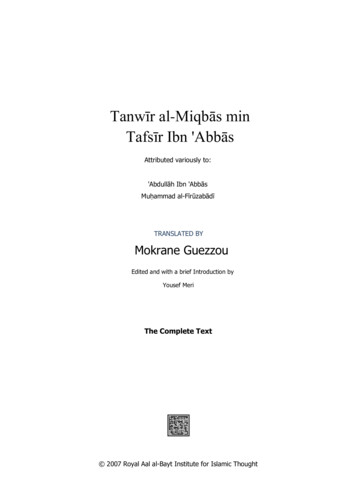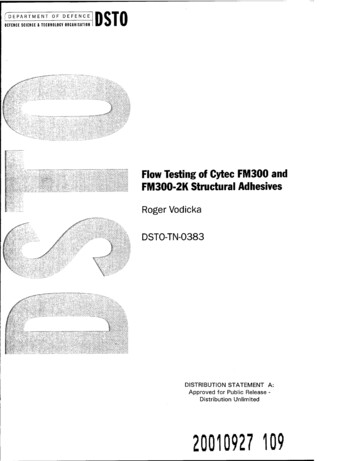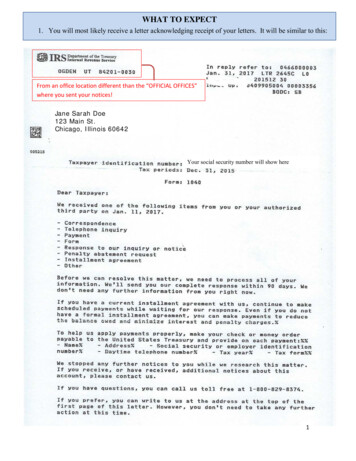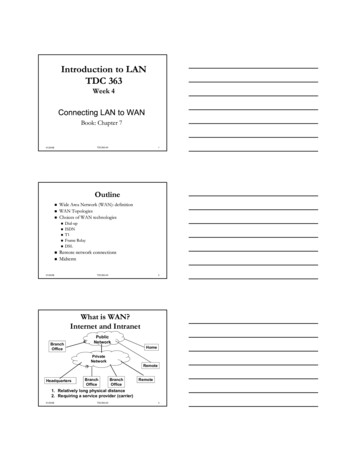
Transcription
Tanwīr al-Miqbās minTafsīr Ibn 'AbbāsAttributed variously to:'Abdullāh Ibn 'AbbāsMuḥammad al-FīrūzabādīTRANSLATED BYMokrane GuezzouEdited and with a brief Introduction byYousef MeriThe Complete Text 2007 Royal Aal al-Bayt Institute for Islamic Thought
Amman, JordanGeneral Editor’s IntroductionUp until now, the fundamental texts of the Islamic faith, apart from the notable exceptions of theQur’an and the Hadith of the Prophet, peace be upon him, have remained out of reach of many Muslims andnon-Muslims alike. Among the most important sources for understanding the Qur’an are the tafsir works,commentaries on the Qur’an, which help to properly explain and contextualise the Revelation. A commonconcern is that the original Arabic works are often obscure, linguistically difficult and physically inaccessible,particularly to ordinary Muslims in the Islamic world and the West, who in seeking to better understand theirown faith, often do not possess sufficient mastery of Classical Arabic ( fusha) to be able to understand theearly tafsir works. Likewise, fundamental works in translation have not been readily accessible or available.Consequently, such works are often erroneously regarded as antiquated and no longer of relevance. Quitethe contrary, the English translations of exegetical works now make it possible to engage these workswithout any preconceived notions and moreover, to use them as a basis for studying the Arabic originals.Tanwir al-Miqbas min Tafsir Ibn Abbas, presented here in English for the first time ever, is thesecond work in the Great Tafsirs of the Qur’an series published by the non-for-profit Royal Aal al-BaytInstitute for Islamic Thought, Amman (http://www.aalalbayt.org). In keeping with the Aal al-Bayt’sobjectives of “Promoting awareness of Islam and Islamic thought, rectifying unsound ideas andmisconceptions about Islam, highlighting the Islamic intellectual contribution and its impact on humancivilization”, the series aims to make widely-available in affordable print and in electronic formats(http://www.altafsir.com) leading exegetical works in translation for study and research in unabridged formwhich are faithful to the letter and meaning of the Arabic. Forthcoming titles in the series include, AlWahidi’s Asbab al-Nuzul (translated by the translator of the present work), Sahl al-Tustari’s Tafsir,Baydawi’s Tafsir, Qushayri’s Lata’if al-Isharat, Al- Nasafi’s Tafsir, and others.Tanwir al-Miqbas is often attributed to the Companion ‘Abd Allah b. ‘Abbas b. ‘Abd al-Muttalib (d.68/687), cousin of the Prophet and father of the discipline of Qur anic exegesis, or to the renowned Shafi‘ischolar Majd al-Din Muhammad Ibn Ya‘qub al-Firuzabadi (d. 817/1414). Despite its uncertain authorship, asdiscussed below by the translator, Tanwir al-Miqbas remains a pivotal work for the study of Islamicexegesis for the following reasons:1. The traditions attributed to Ibn ‘Abbas that are at the core of this work render it as a seminal work ofexegesis.2. This commentary is unabridged and uncensored as are other works in the series.3. The work is an example of the tafsir type known as tafsir bi’l-riwaya or tafsir bi’l-ma’thur. That is, itcontains reports going back to the Prophet (pbuh) or a Companion, in this case Ibn ‘Abbas.4. Tanwir al-Miqbas does not contain elaborate theological or philosophical explanations.5. Tanwir al-Miqbas does not contain the technical grammatical explanations commonly found in otherworks.6. Tanwir al-Miqbas is unencumbered by isnads or chains of transmission, occasionally found in othertafsir works, thus making the work accessible to the non-specialist.
iiHistory of publication and scholarshipThe earliest print edition of Tanwir al-Miqbas was produced in Bombay, India in 1864 by Matba‘Muhammadi. The next edition to appear was the 1873 Bulaq edition which was subsequently reprinted in1951 by Mustafa al-Babi al-Halabi and Sons. In 1937, a private edition was printed in the margins of theQur’an at the expense of ‘Abd al-Hamid Ahmad Hanafi. In 1972, Dar al-Anwar al-Muhammadiyya in Cairoissued a work edited by Muhammad al-Sadiq al-Qamhawi and ‘Abd al-Hafiz Muhammad ‘Isa. In 1976, anedition was produced in Multan, India, presumably a reprint of the 1864 Bombay edition. In 1995 (2001),Dar al-Fikr in Beirut under the supervision of an editorial committee issued the work in a re-edited vocalisededition. In 2000, Dar al-Kutub al-‘Ilmiyyah issued a vocalised edition. Other editions and reprints include Daral-Fikr in Beirut (2001) and Al-Maktabah Al-‘Asriyyah in Sidon (2005). The authoritative Arabic text of thework is now available on the Altafsir.com website (http://www.altafsir.com).Scholarship on Tanwir al-Miqbas in the Arab and Islamic world has thus far been limited. Only onemajor study has appeared which focuses on the exegetical traditions of Ibn ‘Abbas: ‘Abd al-‘Aziz al-Hamidi,Tafsir Ibn ‘Abbas wa Marwiyatuhu fi’l-Tafsir min Kutub al-Sunnah published in 1986 by Umm al-QuraUniversity in Mecca. However, it is to be hoped that publication of this work will lead to the production offurther studies of the work in the Islamic world and the west and to the critical discussion of it in universitiesand academies in the Islamic world and the West.The translator Mr Mokrane Guezzou of the United Kingdom has presented herein a competentlytranslated work which is both accessible and intelligible without the over-reliance on footnotes found insome academic translations of Islamic sources. Finally, we would like to express our appreciation to FonsVitae Publishers, the managing director Aisha Gray Henry, the marketing director Pam Swisher and finally tothe copy editor Elena Lloyd-Sidel.Dr. Yousef MeriRoyal Aal al-Bayt Institutefor Islamic Thought, AmmanSafar 1429/ February 2008Translator’s IntroductionFor Muslims, the Qur’an is God’s final Word to humankind revealed to the Prophet Muhammad inpure Arabic. Metaphysics, eschatology, cosmology, law and morality are all interwoven therein to form abeautiful whole of sublime wisdom. The Qur’an is also—and above all—a book of guidance. It guides thefaithful in all aspects and at all levels of their lives. It directs them to belief in God’s divine oneness anddisbelief in any deity other than Him; it explains what is lawful and unlawful, and draws a detailed way forthem to live harmoniously in this world so as to attain bliss and salvation in the Hereafter. As such, theQur’an contains all that is required for Muslims to have success in this world and in the Hereafter.Unlike any other ordinary book, the notions and concepts mentioned in the Qur’an—whether theyrelate to faith, legal rulings, threats and promises, arguments, allusions or anecdotes of past nations—alternate without any apparent scheme. The Qur’an tackles the same topics time and again but each timeusing different expressions. Some of the injunctions and rulings of the Qur’an are too general to allowspecific applications, while others are too specific to allow generalisation. Some sections of the Qur’an wererevealed before the Prophet’s migration to Medina while other parts were revealed after his migration. Thereare also some Qur’anic verses which abrogated previous ones but both, the abrogating and the abrogatedverses, are still preserved in the Qur’an. The reader of the Qur’an comes across sudden transitions betweeniii
one topic and another. God states plainly in the Qur’an that the Qur’an contains clear and unclear verses(ayat muhkamat wa-ukhar mutashabihat). One finds that in the same passage God may speakinterchangeably in the first and third person and to different audiences without pause or change of style.Just as the Qur’an has dealt with matters, places and people that were unknown to or unheard of by theArabs. More than this, the Qur’an uses some words and expressions which were unfamiliar to many Arabs,since these were either coined from other Semitic languages or borrowed from different Arabic dialects otherthan that of the Quraysh.For all these reasons and many others, the Qur’an has never been a closed book. The Qur’an hadalways needed explanation and interpretation. One notices that the Qur’an explains itself in many places.However, the greatest source of Qur’anic interpretation is without doubt the Prophet himself. A glance at thedifferent collections of Hadith will reveal that a process of interpreting the Qur’an had begun at the time ofthe Prophet. Encouraged by the Qur’an and advice of the Prophet to ask about whatever they did notunderstand regarding religion, the prophetic Companions asked the Prophet about the meaning of manypassages of the Qur’an.1 In some occasions, the Prophet explained the meaning of some Qur’anic verseswithout being asked to do so, while in other instances he asked some of his Companions about certainpassages and then confirmed their understanding or proceeded himself to give their meaning. 2 The exampleof the Prophet was followed by his Companions. Even during the Prophet’s life time, some Companions haddistinguished themselves as experts in the interpretation of the Qur’an. Apart from the four Caliphs, themost noteworthy of these Companions were ‘Abdullah Ibn Mas‘ud (d. 32/652), ‘Abdullah Ibn ‘Abbas (d.68/687), Ubayy Ibn Ka‘b (d. 30/650), Zayd Ibn Thabit (d. 45/666), Abu Musa al-Ash‘ari (d. 42/662) and‘Abdullah Ibn al-Zubayr (d.73/692). However, Muslim scholarship considers Ibn ‘Abbas as the real father ofthe science of Tafsir.The reports related from Ibn ‘Abbas regarding the interpretation of the Qur’an are quite abundant. Infact, there is almost no Qur’anic verse for which one cannot find an interpretation attributed to Ibn ‘Abbas.There are nine different chains of transmission of Ibn ‘Abbas’ reports regarding Tafsir which vary in theirdegree of reliability and authenticity. These chains are as follow: 31- Mu‘awiyah Ibn Salih ‘Ali Ibn Abi Talhah Ibn ‘Abbas.2- Qays Ibn Muslim al-Kufi ‘Ata’ Ibn al-Sa’ib Sa‘id Ibn Jubayr Ibn ‘Abbas.3- Ibn Ishaq Muhammad Ibn Abi Muhammad ‘Ikrimah or Sa‘id Ibn Jubayr Ibn ‘Abbas.4- Isma‘il Ibn ‘Abd al-Rahman al-Suddi al-Kabir Abu Malik or Abu Salih Ibn ‘Abbas.5- ‘Abd al-Malik Ibn Jarih Ibn ‘Abbas.6- Al-Dahhak Ibn Muzahim al-Hilali Ibn ‘Abbas.7- ‘Atiyyah al-‘Awfi Ibn ‘Abbas.8- Muqatil Ibn Sulayman al-Azdi Mujahid or al-Dahhak Ibn ‘Abbas.9- Muhammad Ibn al-Sa’ib al-Kalbi Abu Salih Ibn ‘Abbas.According to Muslim scholarship, the chains of transmission 1, 2 and 3 are reliable, 6, 7, 8 unreliable,while the chain of transmission no. 5 needs scrutiny since it transmits both reliable and unreliable reports.See for example Sahih al-Bukhari, Tafsir.It is not our intention here to give an analysis of the early development of Tafsir. About this development there are two differentversions: the Muslim version and the Orientalist one. See the analyses developed in Muhammad Husayn al-Dhahabi, al-Tafsir wa’lMufassirun, Chapter One, Maktabat Wahba, 2000, and the articles of Claude Gilliot, ‘The Beginning of Qur’anic Exegesis’ and NabiaAbbot, ‘The Early Development of Tafsir’, both in: The Qur’an: Formative Interpretation, edited by Andrew Rippin, Variorum; as wellas thearticle Tafsir in Encyclopaedia of Islam, second edition (subsequently EI2).12iv3Al-Tafsir wa’l-Mufassirun, op. cit., I: pp. 59-62.
What is reported from Ibn ‘Abbas via ‘Ali Ibn Abi Talhah calls for special consideration. This is because it ispossible to compile material of a Tafsir of Ibn ‘Abbas from the reports of ‘Ali Ibn Abi Talhah on the basis ofabout 1,000 texts found in Tabari’s Tafsir.4 In fact, material for an entire Tafsir of Ibn ‘Abbas can also begathered from other reliable reports recorded in collections of Hadith, such as Bukhari, and in earliestcommentaries of the Qur’an such as that of Tabari.Reliable reports from Ibn ‘Abbas regarding the interpretation of the Qur’an are not lacking. But thisdid not prevent some from ascribing a host of reports to this erudite prophetic Companion. There is even anentire commentary of the Qur’an ascribed to him, namely, Tanwir al-Miqbas min Tafsir Ibn ‘Abbas, orsimply Tafsir Ibn ‘Abbas. This commentary was published many times under the above titles as well asunder slightly different titles. Some editions cite Majd al-Din Muhammad Ibn Ya‘qub al-Firuzabadi (729817/13291414) as the author but others simply attribute it to Ibn ‘Abbas.5 So is this commentary the work of Ibn‘Abbas or al-Firuzabadi?There is no doubt that this commentary is not the work of Ibn ‘Abbas. The chain of transmitters ofthis commentary goes back to Muhammad Ibn Marwan al-Kalbi Abu Salih which is described by Hadithexperts as the chain of lies (silsilat al-kadhib), for this line of transmission is utterly dubious and unreliable.One does not even need to use the criteria for reliable transmission applied by Hadith experts to decide thiscommentary’s wrong attribution to Ibn ‘Abbas. It is easy to detect obvious anomalies in the text of Tanwiral-Miqbas which leave one with no doubt that whoever wrote it lived many centuries after Ibn ‘Abbas. Onefinds it, for instance, references to Hasan al-Basri, al-Suddi and even the grammarian Yahya Ibn Ziyad alFarra’ (d. 207/822).6 In a few places, after giving different meanings of the same verse, the author(s) orcompiler(s) proceed(s) to say: “ and this is the opinion of Ibn ‘Abbas” or: “Ibn ‘Abbas says ”, forgettingthat the entire commentary is supposed to be an accurate transmission of what is narrated from Ibn ‘Abbas.Fuat Sezgin, Geschichte des arabischen Schrifttums, E.J. Brill, 1967, I, pp. 25-28.I have used two different editions of this work. The edition of Dar al-Jil: Tanwir al-Miqbas min Tafsir Ibn ‘Abbas, which cites alFiruzabadi as the author and has two additional texts on the margin: Lubab al-Nuqul fi Asbab al-Nuzul and Ma‘rifat al-Nasikh wa’lMansukh attributed to Ibn Hazm. It appears that this edition is an exact reproduction of the Cairo edition of 1951, for even the namesof the Azhar proofreaders of thi
2- Qays Ibn Muslim al-Kufi ‘Ata’ Ibn al-Sa’ib Sa‘id Ibn Jubayr Ibn ‘Abbas. 3- Ibn Ishaq Muhammad Ibn Abi Muhammad ‘Ikrimah or Sa‘id Ibn Jubayr Ibn ‘Abbas. 4- Isma‘il Ibn ‘Abd al-Rahman al-Suddi al-Kabir Abu Malik or Abu Salih Ibn ‘Abbas. 5- ‘Abd al-Malik Ibn Jarih Ibn ‘Abbas. 6- Al-Dahhak Ibn Muzahim al-Hilali Ibn ‘Abbas. 7- ‘Atiyyah al-‘Awfi Ibn ‘A











